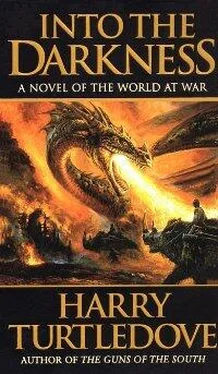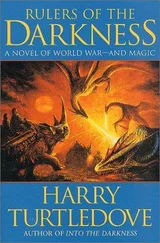“If he’s a Kuusaman, we’ll take care of that,” Szonyi said. He might not have done any fighting till the men from the far east invaded, but he was a veteran now.
“Aye,” Istvan said. “Either we kill him or we send him back so our officers can squeeze him.” Normally, Istvan would have done the latter. As things were, he’d been on his own for a couple of days, and wasn’t sure where to send a captive if he got one.
Getting one, he realized, wouldn’t be easy. That dragon might have been flamed out of the sky, but it was a long way from dead; branches must have done a better job than usual of cushioning its fall. It sounded as if it were trying to knock down every tree it could reach. It didn’t flame, though, which argued it still had a flier on its back: an unrestrained dragon would have vented its fury every way it could.
Kun pointed ahead. “There it is,” he said unnecessarily: that great scaly tail could not have belonged to any other beast. At the moment, it was doing duty for a flail, smashing bushes to bits.
“Surround it,” Istvan said. “Blaze for the eyes or the mouth. Sooner or later we’ll kill it. And watch out for the flier. He’s liable to be blazing at you while you’re blazing at the dragon.”
“I find that highly unlikely,” Kun said. But he did as Istvan told him, so Istvan couldn’t come down on him for talking back. Istvan couldn’t come down hard on him for talking back, anyhow—a disadvantage of lacking formal rank.
Spreading out to surround the dragon made the Gyongyosians cast their net widely indeed. The beast was still doing its best to level the woods. It couldn’t knock over large trees. With that exception, its best was quite good; a stampeding behemoth would have been hard pressed to match it.
Istvan peered through the bushes toward it. Sure enough, it was a Kuusaman dragon, painted in sea green and sky blue. Its right wing and a stretch of the body behind the wing were charred and black. Without a doubt, a Gyongyosian dragon had won that duel in the air. But the Kuusaman still somehow astride it at the base of its neck seemed alert and not badly hurt. He had a stick in his hands and was looking now this way, now that, ready for anything that might happen to him.
For a moment, Istvan wondered why he didn’t get off the dragon and make for the woods. Then he realized the dragon was liable to squash the flier if he dismounted. He raised his own stick to his shoulder and sighted along it. Before he could blaze, the Kuusaman did, but at someone off to the other side. A hoarse cry said the dragonflier hit what he’d blazed at, too.
When Istvan blazed at the Kuusaman, the fellow jerked as if stung. But, even if Istvan’s beam bit, it didn’t knock the foe out of the fight. The fellow used his own stick as a goad, and the dragon, hurt though it was, obeyed the command he gave it. Its head swung toward Istvan. He blazed at it, but it kept turning his way. Its jaws opened enormously, preposterously, wide. Flame shot from those jaws, straight at Istvan.
He thought he was a dead man. Though it was daylight, he looked up toward the heavens, toward the stars where he expected his spirit would go. But the sheet of flame fell short. Trees and bushes between the dragon and him began to burn. He threw his hands up in front of his face to protect himself from the blast of the heat, but the fire did not quite reach him. He stumbled backwards, his lungs feeling seared from the one breath of flame-heated air he’d drawn in.
Coughing, he staggered off to one side of the fire. It would spread, but not quickly; Obuda had had a lot of rain lately, so the plants were full of juice. The dragon was swinging its head away from Istvan now. It flamed again. A shriek of anguish announced that whoever it flamed at this time hadn’t been far enough away to escape the fire.
Istvan blazed at the dragonflier again. His comrades were doing the same now. At last, after what seemed like forever, the Kuusaman slumped down on his dragon’s neck, the stick slipping from his fingers. The dragon, with no one controlling it, began sending bursts of flame in all directions—until it had no flame left to send.
After that, disposing of the great beast was relatively easy, for the Gyongyosians could approach without fear. When it opened its mouth and tried to flame Szonyi, he sent a beam through the soft tissue inside that maw and into its brain. Its head flopped down. The body kept thrashing a while longer, too stupid to realize right away that it was dead.
Kun nodded to Istvan. Istvan nodded back, in some surprise; he thought the dragon had flamed the mage’s apprentice. Kun looked surprised, too. Pointing to the dead Kuusaman flier, he said, “You were right. Those little demons really can fight bravely.”
“Too right they can,” Istvan answered. “If they couldn’t, don’t you think we’d have thrown ’em off this island long since?”
“We did throw ’em off this island once,” Szonyi said. “The whoresons came back.” He paused. “I suppose that says something about them.”
“Aye,” Istvan said. “They aren’t Gyongyosians—they aren’t warriors born—but they’re men.” He pulled a knife from his belt and advanced on the dragon’s carcass. “I’m going to worry a tooth or two, by the stars. When I go back to my valley one of these days, I’ll wear a dragon’s fang on a chain around my neck. That should keep some of the local tough boys quiet.” He smiled in anticipation.
He wasn’t the only soldier who took a souvenir from the dragon, either. Kun cut several fangs from its mouth. “I ought to be able to get some sort of sorcerous use out of these,” he said. “And, as Istvan says, one worn around the neck will be a potent charm against bullies.”
“We earned them, sure enough.” Szonyi’s hands were bloody, as were Istvan’s. They both kept rubbing them on the ground. Even a dragon’s blood burned.
“Aye, we earned them,” Istvan said. “Now we have to hope we drive the Kuusamans off this stinking island and that we get off it ourselves.” A moment later, he wished he’d spoken as if that were assured. For better or worse, though, he’d seen too much fighting to fool himself for long.
Leudast squelched through mud. What the Forthwegians called roads were hardly better than their Unkerlanter equivalents: good enough when dry, boggy when wet. “Wait till the snow starts falling,” Sergeant Magnulf said. “They’ll harden up again then.”
“Aye,” Leudast said. “But winters are milder here than they are farther south, you know. It’s not always one blizzard after another. Only sometimes.”
“That’s right—you’re from not far from these parts, aren’t you?” Magnulf said.
“Farther west, of course,” Leudast answered. “Fifty, maybe a hundred miles west of what used to be the border between Forthweg and Unkerlant. Just about this far south, though, and the weather wasn’t a whole lot different than the way it is here.”
“I’m sorry for you,” Magnulf said, which made Leudast and everybody else in the squad laugh. After he was done laughing, Leudast wondered why he’d done it. The weather in most of Unkerlant was worse than it was hereabouts, or in the part of the kingdom where he’d grown up.
“One good thing about the rain,” a common soldier named Gernot said. “The cursed Algarvians aren’t going to jump on our backs for a while.”
“They’ll drown in the muck if they try,” Leudast said, at which his companions nodded. Some of them laughed, too, but only some. Most realized they would also drown in the muck if the Algarvians attacked.
Magnulf pointed ahead. “There’s the village where we’re supposed to billet ourselves. Miserable little hole in the ground, isn’t it?”
Читать дальше












